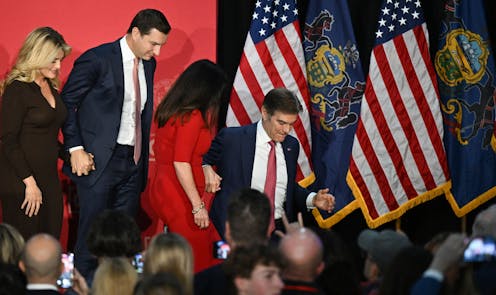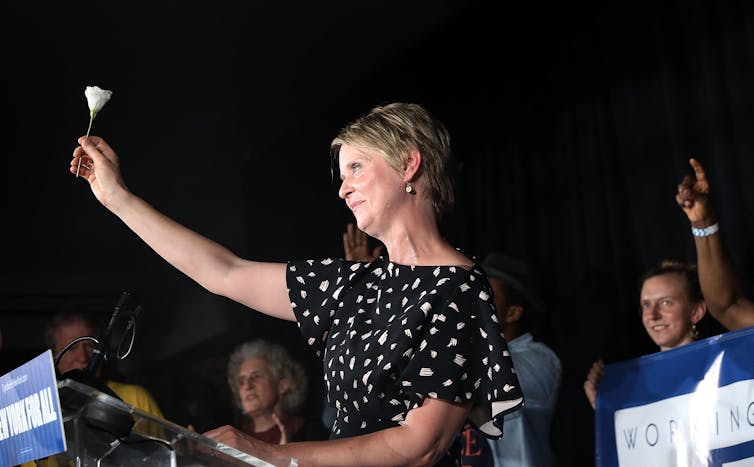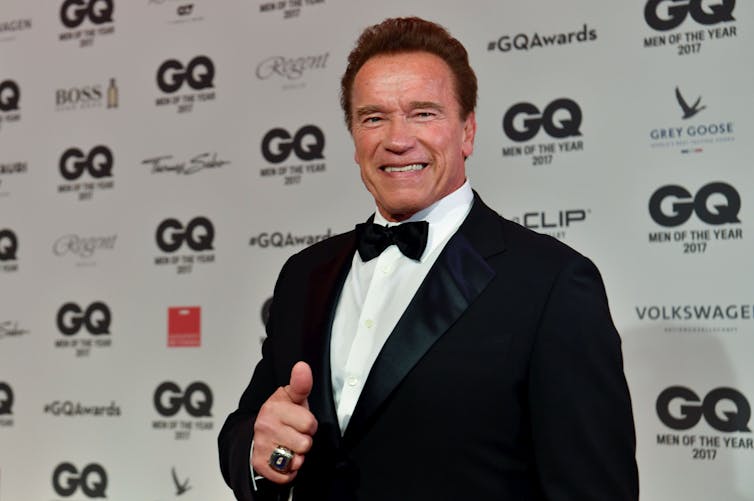Celebrities in politics have a leg up, but their advantages can't top fundraising failures
Celebrity politicians have instant name recognition. But unless they trump competitors in fundraising, and hit other check boxes, they aren’t any more likely to win than traditional politicians.

TV personality Mehmet Oz lost his bid for Pennsylvania senator during the November midterms. And former NFL football star Herschel Walker appears to be falling further behind his opponent, incumbent Raphael Warnock, as they head to a Dec. 6, 2022, runoff election for senator in Georgia.
While celebrity political candidates have advantages, like name recognition and media attention, they often lose their bids for public office.
They lose for the same reasons other candidates lose. If they represent the minority party in a one-party-dominated district or state, they lose. If they take unpopular policy positions, they lose. If they are never considered to be serious candidates, they lose.
I am a political science scholar who specializes in American politics. In my recently published book, “Celebrities in American Elections,” I show that celebrity candidates who win the fundraising battle tend to win their elections – and those who fall behind in fundraising tend to lose.
Political fundraising matters
Both Oz and Walker lost the fundraising battle against their opponents, Democratic politicians John Fetterman and Raphael Warnock, in the November 2022 midterms.
Not including substantial spending by outside political and advocacy groups, Federal Election Commission data shows that Fetterman raised US$17 million more than Oz and Warnock raised $86 million more than Walker.
The ability to raise money is an indicator of a candidate’s strength. It also allows candidates to hire professional staff and pay for advertising to persuade voters.
Candidates, celebrity or not, who raise more money tend to win.
There are many examples that show the specific connection between celebrity candidates raising money during campaigns and getting elected.
Hollywood stars Ronald Reagan, Clint Eastwood and Arnold Schwarzenegger all spent more money than their opponents and got elected. Singer Sonny Bono, meanwhile, spent more than his rival in the mayoral and House races and won in the 1980s and ‘90s. When Bono spent less than his opponent on his Senate seat bid in 1992, he lost the race.
Other examples show the link between celebrity candidates’ failure to top their opponents in fundraising and their eventual loss.
Hollywood performers Shirley Temple, Gary Coleman, Roseanne Barr, Cynthia Nixon, Kanye West and Caitlyn Jenner all raised less than their opponents and lost their elections.
Self-financed candidates who rely predominantly on their own wealth, like Dr. Oz, tend to lose. Because self-financed candidates tend to be political outsiders, they are less likely to be supported by the political insiders who are major donors. The donor class tends to support stronger, more experienced candidates.

Other rules to the game
There are other trends at play during an election. Some of them include whether a candidate is an incumbent and has name recognition and what their party affiliation is. And while celebrity candidates certainly have many advantages, they are not as popular as some observers would suspect.
Pennsylvania and Georgia have been key swing states in recent election cycles, with both the presidency and control of the Senate linked to their voters’ choices.
Political science consistently shows that it is easier to flip an open seat than it is to defeat an incumbent.
Republican Sen. Pat Toomey announced in October 2020 that he would not run again for election in Pennsylvania. That opened the door for Democrats to flip the seat.
Fetterman, a statewide elected official with a strong base of support, name recognition and a fundraising advantage, secured this open seat on Nov. 8. Democrats were worried about losing the race after Fetterman’s poor debate performance, but he nevertheless prevailed.
While Oz had name recognition thanks to his television show, he was successfully defined as a carpetbagger in the state and could not match his opponent’s spending.
In Georgia, incumbent Sen. Raphael Warnock, a Democrat, has a base of support, name recognition and a fundraising advantage. Walker has the name recognition, but he faced questions about his mental fitness and seemed inept on the campaign trail. Although the race is undecided, Walker’s inexperience showed and he has been outspent by Warnock thus far.
For Walker to win the runoff, a few things would need to happen.
Walker would need to gain the votes of the Libertarian candidate, Chase Oliver, who thus far hasn’t endorsed either Walker or Warnock. Turnout in the runoff election is also critical. Polls indicate that Walker leads among voters 50 and older. Older voters tend to vote at higher rates than younger voters, which means Walker has the lead with higher-propensity voters. On the other hand, younger voters seem more energized than in the recent past. Warnock, who has experience with runoff elections, would need to keep young people energized for a few more weeks in order to win.
Finally, in most states, candidates, celebrity or not, can win with a plurality of voters. Indeed, many celebrities who won elected office did so with less than 50% of the vote.
Wrestler Jesse Ventura won with 37% of the vote when he was elected governor of Minnesota in 1998. Arnold Schwarzenegger became the governor of California in 2003 with 49% of the vote. Comedian Al Franken got less than 42% of the vote when he was elected Minnesota senator in 2008. And Donald Trump got 46% of the popular vote when he won the presidency in 2016.
The United States’ plurality rule, which allows a candidate who receives the most number of votes to win, and Electoral College systems have allowed celebrities to win elections even when they have less than a majority. This does not suggest overwhelming popularity; rather, their victories are made possible by specific election rules.

Future celebrity candidates
Oz and Walker won’t be the last celebrities to seek public office. Celebrities have the talent and fame to make them viable political candidates. They are at ease in front of cameras and audiences and they are skilled at creating a personal brand that resonates with the public.
They also benefit from copious media coverage. The free media attention gives them an advantage that noncelebrity candidates do not have.
But it’s likely that celebrities who had political experience before running for office would perform better than celebrities who are political neophytes.
Schwarzenegger and Franken offer an example of how it can benefit celebrity candidates to be involved in politics before seeking office. Schwarzenegger, for example, first campaigned for Proposition 49, a law that created after-school educational enrichment programs, before officially diving into politics.
Franken founded the political action committee Midwest Values and called upon his celebrity friends to donate so he could fund Democratic candidates who would later serve as his political allies. This allowed Schwarzenegger and Franken to learn valuable political skills before running for office. Even Trump was an active political donor and celebrity endorser before declaring his bid for the presidency.
Oz’s loss and Walker’s current deficit demonstrate that even celebrities must pay their political dues before seeking office.
Richard T. Longoria does not work for, consult, own shares in or receive funding from any company or organization that would benefit from this article, and has disclosed no relevant affiliations beyond their academic appointment.
Read These Next
AI’s growing appetite for power is putting Pennsylvania’s aging electricity grid to the test
As AI data centers are added to Pennsylvania’s existing infrastructure, they bring the promise of…
Why US third parties perform best in the Northeast
Many Americans are unhappy with the two major parties but seldom support alternatives. New England is…
From moral authority to risk management: How university presidents stopped speaking their minds
Nearly 150 universities and colleges have adopted institutional neutrality pledges since 2023.






